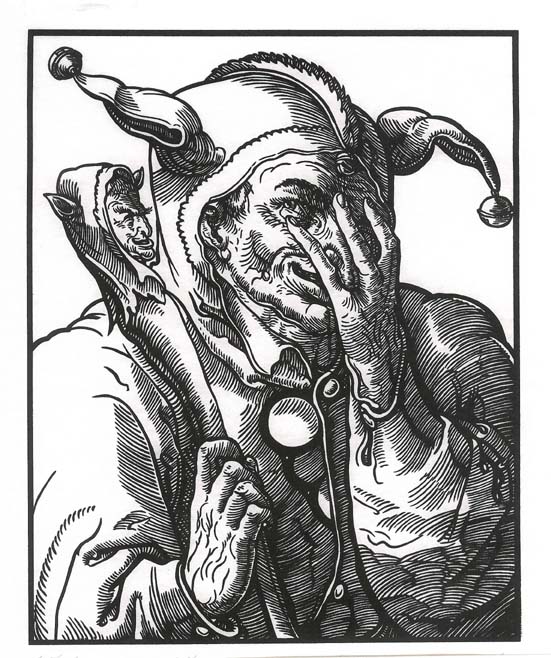Tuesday
This is a small news item that, nevertheless, caught my attention. That’s because it put me in mind of Shakespeare’s fools.
Apparently, Tesla and Twitter owner Elon Musk attempted to do comedy the other night. David Chappelle, a once noteworthy comedian, invited Musk to his show with (as far as I can tell) the intent of giving Elon some comic moments. Instead, Musk was greeted by loud booing. It’s not clear whether this was for how he is destroying Twitter and for his own virulent tweets, including one calling for the prosecution of Dr. Fauci.
Anyway, there were interesting follow-up discussions on (of course) Twitter about why some rich people think they have a turn for comedy. One answer is that people around them are always laughing at their jokes, which means that it comes as a shock to them to discover the laughter is not genuine. As satirist Hilaire Belloc observes in Cautionary Tales for Children,
The laughter of the lesser lynx
is often insincere.
It pays to be polite, he thinks,
if royalty is near.
So when the lion steals his food
and kicks him from behind
he smiles, of course…
but oh! the rude remarks that cross his mind.
Perhaps being surrounded by sycophants explains why the richest man in the world appears to have lost his way. To right himself, he could use a good fool—which is to say, one who uses comedy to speak truth to power. W.S. Gilbert’s Jack Point explains how it works in the Gilbert and Sullivan musical Yeomen of the Guard:
I can set a braggart quailing with a quip,
The upstart I can wither with a whim;
He may wear a merry laugh upon his lip,
But his laughter has an echo that is grim!
When they’re offered to the world in merry guise,
Unpleasant truths are swallowed with a will –
For he who’d make his fellow-creatures wise
Should always gild the philosophic pill!
As it is, the richest man in the world appears to have lost his way. And while we might hope that his association with Chappelle would do some good, it’s not clear that he himself is still up to the job. After all, what comic would invite a humorless billionaire to share the stage with him—unless, at least, he planned to use him as a foil, which did not appear to be Chappelle’s intent.
Serving as a fool for the rich and powerful is not an easy job, as Feste in Twelfth Night knows all too well: Olivia has fired him before the play opens (perhaps he made a premature joke about her dead brother), and he needs another joke to get back in her good graces. The fool in King Lear, meanwhile, expresses the fool’s dilemma: sometimes a good comic is damned no matter what he (or she) says or does. In the following interchange, Lear’s fool has just made jokes about the ex-king making “thy daughters thy mothers: for when thou gavest them the rod, and put’st down thine own breeches.” He then goes on to say,
Fool: Prithee, nuncle, keep a schoolmaster that can teach thy fool to lie: I would fain learn to lie.
Lear: An you lie, sirrah, we’ll have you whipped.
Fool: I marvel what kin thou and thy daughters are: they’ll have me whipped for speaking true, thou’lt have me whipped for lying; and sometimes I am whipped for holding my peace. I had rather be any kind o’ thing than a fool: and yet I would not be thee, nuncle…
Whatever Chappelle’s original intent, he did get off some good barbs at Musk’s expense. For instance:
–“It sounds like some of the people you fired are in the audience”;
–(referring to Musk’s Mars aspirations), “his whole business model is fuck Earth, I’m leaving anyway”; and
–(after a desperate Musk asked him what he should do in response to the booing), “Don’t say nothing. It’ll only spoil the moment. Do you hear that sound, Elon? That’s the sound of pending civil unrest. I can’t wait to see what store you decimate next, motherfucker. You shut the fuck up.”
Despite these comebacks, however, Chappelle appeared discomposed by the booing and ineffectively attempted to stop it before abruptly ending the show. Chappelle appears to have lost some of his own comic touch—his once remarkable ability to gauge the public pulse—as can be seen in his attacks on the vulnerable trans community. In these he has been violating Jonathan Swift’s #1 rule about comic satire, which is that a satirist should never hit down.
But back to Musk. When a joke gets made at your expense, one of your few good options is to laugh at yourself. Did the billionaire, in the words of Gilbert’s Jack Point, at least manage to “wear a merry laugh upon his lip,” even though “his laughter ha[d] an echo that is grim!”
Actually, it sounds like Musk didn’t even manage that much since the next day he tweeted that only 10% of the audience were booing him while the rest were applauding. That sounds like an explanation provided by a sycophantic underling, and it reminds me of Smithers’s consoling words to his boss Mr. Burns in a comparable situation on The Simpsons: “They weren’t saying, ‘Boo!’ They were saying, ‘Bu-urns!’”
While advocating that the rich and the powerful hire professional fools, however, I also have to acknowledge that it might not do any good. As Swift again observes, “Satire is a sort of glass, wherein beholders do generally discover everybody’s face but their own.”
